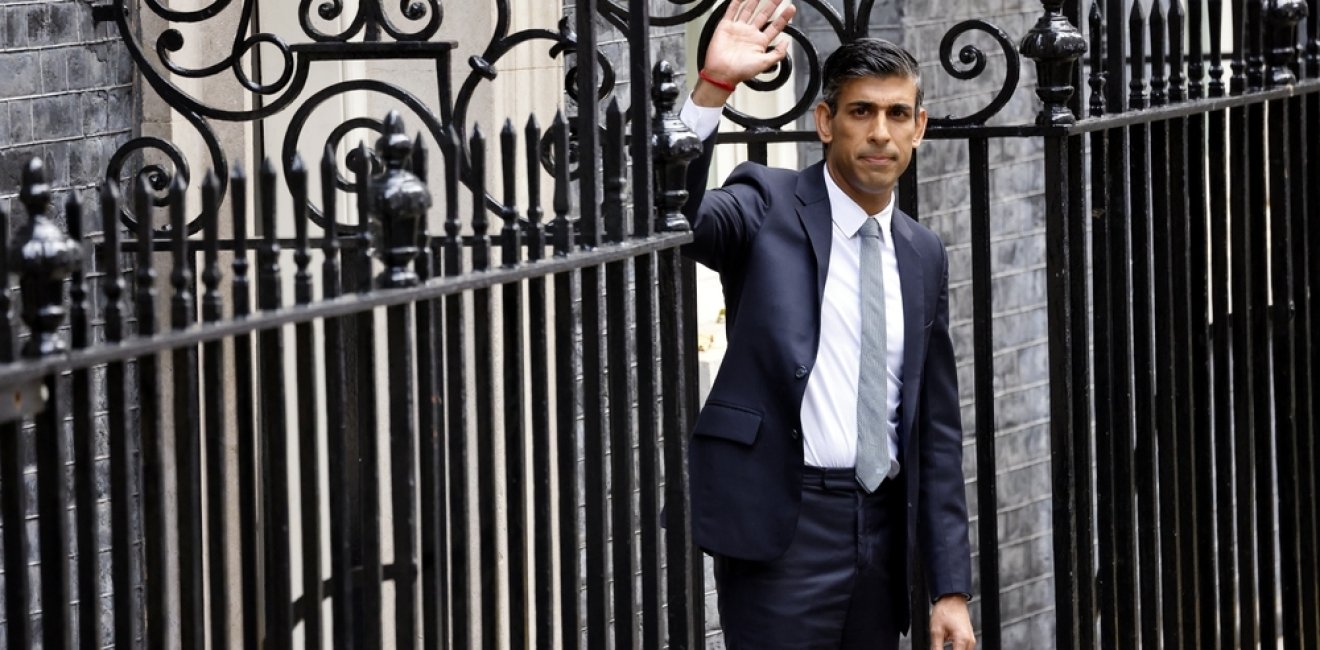Prime Minister Rishi Sunak has spoken of the critical decisions that voters must make in this “dark and dangerous world.” On his way to Poland in April, Sunak told journalists on board his plane: “Unfortunately, we are living in a world more dangerous than we’ve known it in decades, probably more dangerous than [at any time since] the end of the Cold War.” The Prime Minister has made foreign policy a central feature of his Conservative campaign and he has a forceful Foreign Secretary in Lord David Cameron, the former Prime Minister. On the Labour side, David Lammy, the Shadow Secretary for Foreign & Commonwealth and Development Affairs also sees challenges ahead: he has argued the 14 years of Conservative government has damaged the UK’s influence “in a more divided and dangerous world.” In the current edition of Foreign Affairs, he calls for a new approach underpinned by “progressive realism.”
All UK foreign policy goals – whether Conservative or Labour -- are constrained by the budget. Low growth at 1.7 percent and low productivity at 0.4 percent do not allow the global performance that Britain achieved in the early 20th century. While GDP growth within the European Union (EU) has averaged 4 percent since 2019, GDP growth in the UK has averaged 2 percent. Realism requires that the UK avoid going it alone. Instead, it must partner with other like-minded nations.
Partnership with the United States is clearly the preferred partner, but Westminster’s ability to influence the US is limited. It remains a junior partner in the alliance; one that is respected and in the crisis over Indo-Pacific submarines clearly preferred in the amended AUKUS agreement. Washington also recognizes Westminster’s courage and determination in forwarding sophisticated weaponry to Ukraine and training Ukrainian pilots on the F16. But the UK’s ability to push for a faster decision on US funding for Ukraine was limited (Lord Cameron could not even get a meeting with the Republican Speaker of the House of Representatives.)
As we approach the November election, both the Conservatives (a.k.a. Tory party) and Labour see the US as an unpredictable ally. Labour leader Keir Starmer has closer philosophical ties with the Democratic party but is preparing for a transactional relationship should Donald Trump win. Meanwhile, the Tories remain committed to a future US-UK trade agreement – one that would distinguish UK trade from the European Union and protect vital industries as well as the “special relationship.”
Neither Labour nor the Conservatives are prepared to embrace a return to the EU single market. Labour, however, is closer to working with Brussels on a number of issues and will not demand withdrawal from the European Court of Human Rights. Notwithstanding that solutions to the UK’s low productivity and economic growth lie within the EU, both leaders will stand by Global Britain and bilateral free trade agreements, most of which replicate agreements with the EU. They remind voters that the UK has regained freedom to be a global trading nation.
In the Middle East, both the Tories and Labour support Israel’s right to defend itself. In repeating this assertion, Labour leaders are conscious of concerns about antisemitism under their former leader, Jeremy Corbyn. Keir Starmer must also contend with strong support for Palestine within Labour ranks. Like the US, Labour has a groundswell of young voters determined to stop Israel’s bombardment of Gaza; they are urging the government to use whatever leverage it can muster to protect Palestinians and achieve a prolonged ceasefire. Shadow Foreign Secretary David Lammy has also expressed his support for the ICC’s call to arrest certain leading Israeli politicians. In this call, he parts company from Starmer, but his words reflect the divisions within the Labour party towards the Gaza war.
Cameron as the former Conservative Prime Minister has reintroduced a more resolute foreign policy. Back in November 2023, he warned Israel that it will never be secure unless there is "long-term safety, security and stability for the Palestinian people.” Currently Cameron is working with nations in the region; to devise a peace plan acceptable to both Israel and Palestinians. Recognizing that Whitehall has little leverage with Netanyahu, he readily works also with Washington to put forward a peace plan and achieve the return of hostages of whom some are dual British-Israeli citizens.
Regarding China, both political leaders have a difficult decision to make. Should the UK join with the US in protecting itself against Chinese dumping of solar panels, electronic vehicles and other electronic goods, or should it seize the opportunity to achieve climate goals through importing cheaper electrical vehicles from China? The debate extends to artificial intelligence (AI). The dilemma is whether national security should take priority over efficiency and the green transition. With the UK economy facing slow growth, high interest rates and high debt, the dilemma is real. Support of Taiwan remains key to the Tory government which recalls the scrubbing of freedoms and human rights in Hong Kong. It can pride itself on the offer of a safe homeland for Hong Kong Chinese after the crackdown. Labour may be less vocal but will back US leadership in protecting democracy on the island nation.
Labour is committed to working with African nations but recognizes that this cannot be done through aid programmes alone. African leaders, with a long - not always easy - relationship with Westminster, are asking for trade not aid. They seek to be consulted and treated as equals. With China and Russia offering development projects at cheap interest rates, Labour must persuade British industry that commercial and mining opportunities exist in Africa. This may be easier for Conservatives, with their traditional closer relationship to the Confederation of British Industries.
Managing the civil war in Sudan will continue to be a challenge for the new British government. Long term ties with Khartoum’s political leaders provide knowledge and understanding of the tribal and ethnic tensions. Consequently, British diplomats are active in providing humanitarian aid and calling for cessation of hostilities. They urge both the Sudanese Army and the paramilitary Rapid Support Force to engage in an inclusive dialogue and stop fighting. Westminster exercises leverage through the provision of £42.6 million in humanitarian aid and the pledging of £89 million in additional funds. But Britain alone cannot stop the killing and it must work with the regional players, Egypt, Turkey and the UAE whose military hardware support for both al-Burhan and Hemedti has enabled both generals to continue their brutal conflict.
Rwanda is the one clear distinction between the Conservatives and Labour. The effort to offshore illegal migrants by sending them to Rwanda may have found favor with Tory voters seeking to deter them from reaching UK beaches. But it has produced a legal minefield as individual migrants seek human rights protection to save them from boarding chartered flights to Kigali. Labour has repeatedly stated that it will end this policy.
Both Labour and the Tories have expressed full throated support for Ukraine in its defence against Russia. There is no distinction in their commitment to both train Ukrainians and deliver sophisticated weapons ahead of the Biden administration. To date, the British government has given 12.62 billion EUR to Ukraine according to the Kiel Institute’s aid tracker; third overall in bilateral aid, behind the United States and Germany.
The single greatest constraint on achieving a dynamic Global Britain is the economy. Since 2019, GDP growth has averaged 2 percent, while the EU has averaged 4 percent, and US GDP has grown by 10 percent. Public spending on health, education, housing and infrastructure absorbs 45 percent of the UK’s budget, leaving little for defense, aid programmes or the Foreign, Commonwealth and Development office. Tight budgets constrain big plans and diplomatic partnerships are the best option for a nation with great talent, but less cash to spend.
Author


Global Europe Program
The Global Europe Program is focused on Europe’s capabilities, and how it engages on critical global issues. We investigate European approaches to critical global issues. We examine Europe’s relations with Russia and Eurasia, China and the Indo-Pacific, the Middle East and Africa. Our initiatives include “Ukraine in Europe”—an examination of what it will take to make Ukraine’s European future a reality. But we also examine the role of NATO, the European Union and the OSCE, Europe’s energy security, transatlantic trade disputes, and challenges to democracy. The Global Europe Program’s staff, scholars-in-residence, and Global Fellows participate in seminars, policy study groups, and international conferences to provide analytical recommendations to policy makers and the media. Read more

Explore More
Browse Insights & Analysis
Greenland’s New Governing Coalition Signals Consensus

The Future of France's Far-Right Party

Ukrainian Issue in Polish Elections

